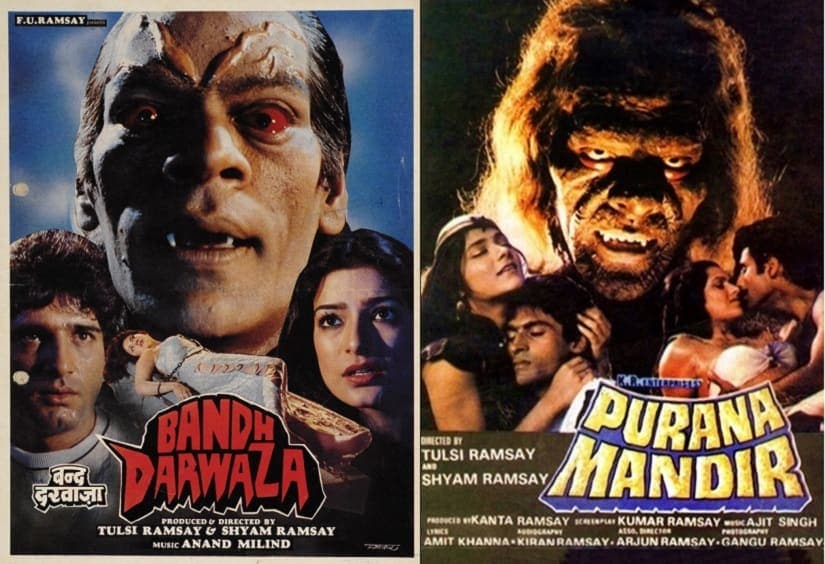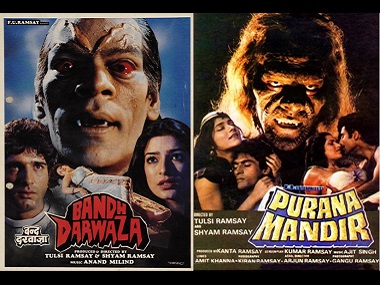Rintu Thomas and Sushmit Ghosh’s short documentary on the Ramsay brothers hits the right note with the title itself: Kings of Horror. For the Ramsays truly did preside over an empire that they created from scratch. An empire populated with furniture borrowed from countless horror sub-genres. A kingdom full of sprites, demons, muscular and lascivious men, brooding women in white and ghostly apparitions, scantily clad girls and Shakespearean fools — all jousting, dancing and navigating their way through the surreal fogscape of their films. Their sultanate of kitsch offered viewers a tempting experience of forbidden pleasures. Their pioneering work filled a gaping hole in Bollywood, made their surname synonymous with Indian horror and, perhaps most importantly, made movies fun again. The potpourri-esque nature of the Ramsay brothers’ films perhaps explains the neatly divided structure of Thomas and Ghosh’s 27-minute documentary. Horror, comedy and sex, the three essential ingredients of the Ramsay film, are explored one by one. Considering the short time span of the documentary, it helps provide a clear introduction to what they were all about. [caption id=“attachment_7376501” align=“alignnone” width=“825”]  Posters for the Ramsay Brothers films Bandh Darwaza and Purana Mandir[/caption] Running commentary on the Ramsays’ work accompanies the images. Modern filmmakers and writers like Anurag Kashyap, Sriram Raghavan, Ashim Ahluwalia and Jerry Pinto make interesting observations on the craft and significance of the films. The films have the logic of a dream for one, their stratagem to scare runs counter to established Hollywood wisdom for another. The Ramsays signify liberation for one filmmaker and the naked face of the forbidden for the other. Actors and actresses from their films occasionally chime in, sharing anecdotes about the Ramsays’ efficient and highly individualistic style of filmmaking. The Ramsays themselves declined to be interviewed for the film. Maybe that’s fitting because their legacy is edified by their conspicuous absence in the documentary. The documentary is consistently intelligent. Its evaluation of the Ramsays’ contribution to cinema is balanced and the appraisal of their aesthetics sincerely worded. But it throbs with the rawness and unwieldiness that was a hallmark of the Ramsay’s work. The talking heads offer insights into the unabashedly surreal worlds the brothers fashioned for their films. They presented a nostalgia for the darkness. Totems and symbols abounded — crosses and tridents — alongside the gothic castles that defied logic but had a transportive effect on the viewer. Consider the typical Ramsay film a feature length voyage through the Upside Down. They took the world as we see it, turned on the artificial lights, threw in a monster or two and created a mythology of their own. The omnipresent music and the rolling fog made their films instantly recognisable. The age-old battle of good and evil, the power of curses and viewers’ willing suspension of belief turned the films into profitable enterprises. Kings of Horror provides the uninitiated a glimpse of the kitschy treasure that awaits them. For those who grew up on a steady diet of these films, the documentary does the commendable job of placing the Ramsays’ work within the larger context of Bollywood. The montage set to a lively electronic score that ends the documentary is a rousing celebration of their work. It can also be read as a clarion call for a longer, more deliberately paced visual exploration of the Ramsay legacy. Surely the 30-odd films that they made deserve a closer, lengthier examination. There could be a section dedicated to their use of music and furniture itself, which more often than not makes appearances in multiple films, in effect making a Ramsay universe. This band of seven brothers created something unprecedented in Hindi cinema: a world of their own, governed by their rules; a whimsical logic or perhaps the lack of it; and a series of films that, when taken together, represent a collective deep breath of relief from the stultifying cinema that had become the norm. Incidentally, I watched Kings of Horror the day Shyam Ramsay passed away. It seems like a coincidence not uncommon in one of his films. Maybe a sign that we’re living in a world he helped devise. Or simply the Ramsay world turned inside out.
The Ramsay brothers created something unprecedented: a world of their own, governed by their rules; and a series of films that, when taken together, represent a collective deep breath of relief from the stultifying cinema that had become the norm.
Advertisement
End of Article


)
)
)
)
)
)
)
)
)



